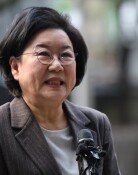[Editorial] ``Broadcasting Media As The Core Support Of The Government``
[Editorial] ``Broadcasting Media As The Core Support Of The Government``
Posted July. 02, 2001 09:47,
A newly reported media related document, which includes the content that the broadcasting media should be used as the core to back the government, is creating a stir.
It is suspicious as to whether the government have planned and created a scenario to control over the media, since the newly reported document under the title of the `Plan for the New government’s Media Policies` is in line with other media related documents, which were drafted later. This document include 6 items, including the `plan for the outside condition improvement for the successful reform` (June, 1999), `the strategic framework for the people’s government and media` (August, September, 2000), and `the analysis on the recent media’s editorials` (November, 2000).
This document suggests that ``instead of newspapers, broadcasting medias should be used as the ally,`` because there is high possibility for the publication of the strong oppositional newspaper. The document also says that the government should take the indirect leadership as much as possible to control over the media based on the legal and the institutional grounds. It also pointed out that the government should maintain either restriction or cooperation through the institutional apparatus based on the principle of the market economy, such as fair trade, in case of newspapers.
One cannot overlook the fact that the content of the document is similar to the recent situation. Especially, the report attitude of the three broadcasting companies reflects exactly what the document states. For instance, after the tax audit result was reported, three broadcasting companies barely mentioned their problems, while criticizing newspapers everyday, especially Dong-a and Chosun, which are critical of the government,. Recently, one broadcasting company reported on the result of the tax audit and the investigation process on the media companies for 20 minutes, along with only 10 seconds of explanation from the media companies. It broadcasted only the content with the pro-government position in a scene in which the public opinion was suggested concerning this issue. Another broadcasting company reported as if the guilty verdict had been confirmed over the issue which did not have any legal judgment yet. As the document timely reveals, the government clearly shows that it uses the broadcasting media for the reform of the media. It is certainly questionable as to what these broadcasting media companies had voiced when particular newspapers took initiatives in pushing for democratization protesting against the dictatorship.
Having considered this situation, it seems clear that the tax audit, Korean Fair Trade Commission’s investigation on the inside trade, and the resurrection of the newspaper directive are carried out under the government’s intention to control particular newspapers. It is regretful that the government drives the particular newspaper into a corner by mobilizing the pro-government broadcasting media because the government could not bear the criticism.







